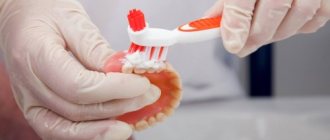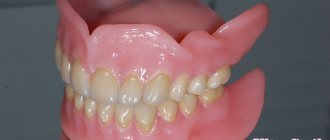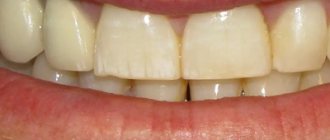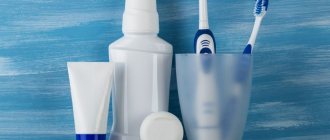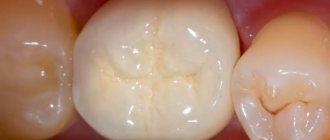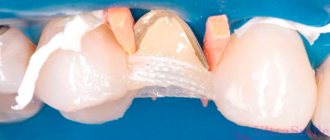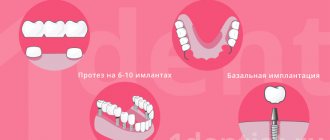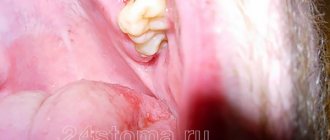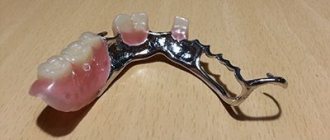About 50% of those who use removable dentures in everyday life indicate that the main problem in their use is insufficient strength of fixation in the oral cavity. This feature is the reason that when performing certain actions (eating, talking, laughing), the prosthesis can noticeably shift relative to its normal position.
To avoid such troubles, it is recommended to use special means that ensure high-quality fixation of dentures in the oral cavity.
Typically, when it comes to nylon and acrylic dentures, creams and gels are used. Gels are not inferior to creams in their functionality and differ from them only in consistency. Creams have a denser structure and are better suited for those who are just starting to use removable dentures.
Below we will consider the main means that are used for reliable and long-term fixation of dentures, their advantages and disadvantages.
How to quickly get used to removable dentures
Naturally, each person is individual, and the duration of adaptation directly depends on the model and materials of construction. Conventionally, the process of addiction can be divided into three stages:
- irritation stage, which lasts about 7-10 days,
- stage of conditioned inhibition (duration – 3 weeks),
- the stage of full adaptation, when the patient completely gets used to the new artificial teeth (occurs after 30-40 days).
Immediately after installation, removable dentures may cause you nausea, increased salivation, changes or complete loss of taste, and difficulty eating. Diction problems also occur. But as you get used to the design, all manifestations disappear completely or are reduced to a minimum.
“Of course, there are patients who cannot get used to any removable dentures, even if they are made perfectly and in exact accordance with the bite. For example, with an increased gag reflex or if there is initially no psychological mood. In such situations, you need to look for alternatives and the best solution is prosthetics on implants, which is hundreds of times more comfortable and does not cause such unpleasant sensations.”
Chorny Stanislav Vladimirovich, orthopedic dentist, work experience more than 16 years
Can't get used to removable dentures? Dental implantation will solve all your problems. In 1 day and forever. Lifetime guarantee on doctors' work.
Free consultation
During the period of getting used to the prosthesis, you need to wear it constantly, without removing it while eating and sleeping. You should not use it in case of acute pain - it is better to consult a doctor to correct the design.
It is important to understand that any removable denture, especially if it is installed for the first time, will require regular correction. The gums sag along with the bone tissue, the position of the joint changes, the bite is adjusted - all this will lead to the fact that the prosthesis will seem uncomfortable. One visit to the doctor and the position of the device will change - you will become more comfortable. Remember this and do not ignore your doctor's recommendations.
Fixing spacers
This remedy is most often used during the first weeks of wearing a prosthetic structure. Accustoming to a foreign product in the oral cavity occurs differently in different patients. Some experience increased salivation, while others experience discomfort and problems chewing food. Products made of soft fibrous fabric allow you to very carefully fix the prosthesis on the gum. At the same time, they attach well, do not change the bite and protect the gum tissue from rubbing or pressure from the prosthesis. Before applying the fixing gasket, it should be immersed in warm water to wet it. As soon as the product is saturated with water, it can be placed on the inner surface of the prosthesis.
The main indications for using a fixing gasket are:
- significant deformation of the gums as a result of prolonged absence of teeth;
- individual features of the jaw structure;
- atrophic changes in the bone tissue of the upper or lower jaws.
Experts recommend changing retaining pads daily and not neglecting the rules of oral hygiene. It is necessary to regularly clean both the gums and teeth, and the prosthetic device itself. Otherwise, if there are food residues or oil stains on the base of the prosthesis, the gasket will not be fully fixed.
Patients who use this type of prosthesis fixation recognize its obvious advantages:
- protection of the gums from contact with polymer materials of the prosthesis;
- long-lasting and high-quality fixation for 8 hours;
- absence of allergic reactions and irritation of gum tissue;
- effective correction of tissue adhesion during gum deformation;
- antiseptic and aromatic additional effect.
How to restore diction
To restore diction, it is recommended to speak as much as possible: read books, pronounce tongue twisters, while holding one or more sweets in your mouth (without sugar! For example, Sula with mint or sea buckthorn).
15-20 minutes, several times a day. The duration of the course is the first 1.5-2 weeks after prosthetics. Tongue twisters for restoring diction after removable prosthetics
| For your convenience, we have selected several useful tongue twisters |
| The snout pig was white-nosed, blunt-nosed; I dug up half the yard with my snout, dug, dug. |
| Karl stole Klara's advertising, and Klara stole Karl's budget. |
| In Kabardino-Balkaria, valocordin from Bulgaria. |
| The fast talker quickly said quickly, That you can’t quickly talk all the tongue twisters, but you can’t over-speak all the tongue twisters, But, having quickly spoken, he quickly said, That you can’t talk all the tongue twisters, but you can’t over-speak. |
What hygiene products can be used
Hygiene products for the care of removable dentures
| Name | Description |
| Toothbrush | You will need a personal brush with soft bristles; too hard can lead to scratches in which bacteria will accumulate. We recommend the Curaprox brand – brushes with soft or ultra-soft bristles. They do not damage the plastic, but do an excellent job of removing plaque on the teeth, also cleaning it from under the gums. |
| Toothpaste | Low-grade, for example, Parodontax, ROCS To clean the prosthesis itself, you can also use children's paste - it is more gentle. |
| Irrigator | The device is necessary both for cleaning your own teeth, if they remain in the mouth, and for cleaning dentures - it effectively removes plaque and allows you to clean the interdental spaces very efficiently. |
| Citric acid and soda or tablets for cleaning and disinfection | Use for periodic cleaning and disinfection of structures - make solutions for rinsing the mouth or place dentures in them (applies to citric acid and soda). The tablets must be dissolved in water and the resulting solution must be used to soak the structure. |
Requirements for cleaning products for orthopedic structures
A product for cleaning artificial crowns and gums must meet the following requirements:
- Efficiency. It is important that the product helps quickly remove all food debris from open and hard-to-reach areas.
- Safety. The composition should not contain toxic substances, foaming agents, or abrasive particles.
- Comfort of use. Good pasta has a pleasant or neutral taste.
Besides these, there are other requirements. For example, paste for dentures should not scratch their surfaces or change color. It is also desirable that after using it, a feeling of freshness appears in the mouth, and all unpleasant odors disappear.
What to do if the prosthesis rubs and does not fit well
- use ointments (Solcoseryl, Metrogyl Denta) or sea buckthorn oil. Apply the oil to the gums for a maximum of 20 minutes after eating and cleaning the denture 3-4 times a day,
- It is forbidden to sharpen dentures yourself, after which you can simply throw it away,
- If there is acute and constant pain caused by rubbing of the structure, you should consult a doctor for correction. 2-3 hours before the visit, the denture should be in the mouth so that the reason why the structure is rubbing becomes visible.
If the device is not fastened well, then you should contact your attending physician - an orthopedic dentist. If the correction does not help, you will have to use special fixation creams: Protefix, Corega, Lacalut Dent. Choose the one that suits you - according to taste, consistency, fixation time. Try different options and choose the best one.
How not to make a mistake with your choice
If you have installed dentures and still don’t know how best to clean them, you can seek advice from your doctor. He will help you choose the product that will be most effective for you. However, it is not always possible to choose your ideal option the first time, and you have to use the trial method. However, when choosing, you should definitely take into account contraindications for use and possible side effects. Sometimes it happens that in some patients tablets of one brand cause allergies and individual intolerance, while in others they do not.
“Before I met Protefix, I always gave preference to Corega - I used all care products only from this brand. It was so convenient and it seemed that it was very correct, because... All products from the same series complement each other. But Protefix won me over the first time - it seemed to me that the results from their use were better, because They were able to remove a stain that the cores couldn’t handle at all.”
Tamara Vitalievna, review from the dental portal gidpozubam.ru
How to eat after installing structures
If the prosthesis is made of comfortable materials, if it suits you, then you will be able to eat well right away. Restrictions occur when little time has passed after the removal of living teeth, when you initially had gum inflammation. In such situations, pressure causes pain; you need to limit the chewing load to avoid discomfort and allow the gums to recover.
In general, during adaptation it is advisable to adhere to the following recommendations:
- give preference to soft and warm foods, exclude viscous foods,
- you need to chew carefully and thoroughly, cut food into small pieces,
- It is better to chew food on the side where the process does not cause pain,
- You should refrain from biting food with your front teeth.
After adaptation, when the prosthesis no longer causes pain, you can return to your usual diet. But you should exclude foods that are too hard, viscous, sticky, excessively hot and cold (drinks and soups should be warm, ice cream should be kept a little at room temperature).
How to clean dentures and remaining teeth
You need to brush your teeth exactly as you are used to: in the morning, in the evening and after every meal. But as for prosthetics, the recommendations will be as follows:
Daily care
- clean the structure in the morning and evening with a soft toothbrush using toothpaste without abrasives or regular soap (preferably baby soap). Pay special attention to the internal area that is in contact with the gum,
- Soak the denture daily in a solution of citric acid (1 teaspoon per 150 ml of warm water): soak it for 10 minutes to disinfect and loosen plaque. Carry out the procedure before brushing your teeth 2 times a day. Afterwards, rinse thoroughly with water. Change the solution every 3-5 days,
- after each meal, the structure is removed and thoroughly rinsed under running water,
- Additionally, you can use an irrigator, which will clean the microscopic gaps between the crowns of the structure,
- Be careful when brushing your teeth, especially if there are small parts - hooks, clasps, so as not to damage them.
Periodic care
- soak in a disinfectant solution - for this you need to purchase special tablets for removable dentures (Protefix, Corega, Lacalut Dent). Use up to 3 times a week while maintaining daily hygiene. Use according to instructions (keep in solution for 15-20 minutes),
- use products that suppress the activity of oral microflora (especially important several years after the installation of dentures, since more plaque accumulates on them). For example, “Tantum Verde” (spray, lozenges) - relieve inflammation and tension, freshen breath.
Modern equipment - ultrasonic sterilizers - can be used to disinfect dentures. They allow you to achieve ideal cleanliness of artificial teeth at home, cleaning them from bacteria and plaque. These devices can also be used to disinfect any other items - toothbrushes, baby bottles, etc.
Nylon dentures
To preserve the properties of nylon structures for a long time, we must not forget about special care, otherwise the loss of their aesthetics and functionality and an unpleasant odor are guaranteed.
Caring for nylon dentures involves home and professional cleaning. When cleaning the house, nylon can be scratched if you use hard brushes. Therefore, it is recommended to acquire only soft models of brushes and pastes that do not contain abrasive substances. To protect against damage, they should be put on or taken off over a sink filled with water. You can fold a terry towel in several layers and carry out these manipulations over it.
Due to the fact that this material is capable of absorbing foreign odors and being stained by drinks and food, wearers of such prostheses need to disinfect them more often. For these purposes, dental nylon liquid, cleansing tablets such as Corega or ROCS are used.
To remove bacterial plaque from them that cannot be cleaned at home, an ultrasonic bath is used. The procedure is performed by a doctor in the clinic, where he also examines the gums under the structure. Thanks to the use of ultrasound, the surface gets rid of not only bacteria, but also coloring substances (nicotine) and tartar.
Do I need to remove dentures at night?
Modern “removers” can be worn constantly and it is not necessary to remove them at night – especially during the first 2-3 weeks, while adaptation to the designs occurs. However, outside the oral cavity, dentures with a plastic base should NOT be placed in a humid environment, since favorable conditions are created for the development and growth of pathogenic microflora. This can lead to bleeding and gum inflammation.
If there are metal elements, the prosthesis must also not be stored in tap water, especially chlorinated water - this can lead to metal corrosion.
For storage and transportation, it is necessary to use specially designed protective ventilated boxes/cases in which the prosthesis will be kept clean and dry.
Give up removable dentures forever! Consultation + diagnosis + treatment plan FREE. Find out which dental implantation method is right for you in 1 day!
Enroll now
Is it possible to whiten dentures?
If hygiene is insufficient, dentures may change their shade. But, unfortunately, it is impossible to bleach it to its original state, especially if a lot of plaque has accumulated and the coloring pigments have penetrated deep into the pores of the material. The doctor can perform polishing - the prosthesis will be smoother, its top layer will be a little ground off, so the structure will be visually lighter. At home, you can try using special whitening tablets (for example, Corega), but you should not overuse them - they can damage the prosthesis materials.
How to know when it’s time to change your dentures
It is recommended to change dentures every 3-5 years or 5-7 years (depending on the material and type of construction).
When using removable dentures, the load from chewing food on bone tissue is only insignificant, which is fraught with its gradual resorption. The jawbone decreases in size, and not always evenly. This process takes from six months to several years and leads to a discrepancy between the shape of the prosthesis and the relief of the gums - the prosthesis is less secure and becomes less stable. This means relocation (if possible) or complete replacement of the structure is required.
In addition, materials wear out over time under the influence of saliva, nicotine, food irritants, and mechanical stress. Cracks appear on the structure, the surface becomes less smooth, which contributes to the accumulation of a large amount of plaque. If you have chosen crowns made of plastic (namely, they are in most cases used in removable orthopedic devices), it is worth considering that they wear down quite quickly, so after about 2-3 years the bite changes, which can affect the condition of the joint and the process of normal chewing food.
Care products
Modern means for caring for dentures are varied and more effective than the old-fashioned solutions with soda and potassium permanganate, which will do more harm than good. They are specially designed for different types of structures, therefore they are absolutely harmless.
Care products can be fixative or cleansing. The most popular of them are fixing adhesives and creams. They contribute to a reliable fit of the prosthesis and redistribution of the load during chewing. It prevents food debris from getting under them and does not rub the gums, since the glue creates an airtight cushion. At night, the structure with fixing substances must be removed, this is the condition for their use.
Fixing powder is suitable for people with weak salivation. A thin layer of powder is applied to the structure, which is pressed tightly against the gums, creating an obstacle to food particles. And strips of special canvas for fixation are necessary if a person has an abnormal jaw structure.
Another common remedy is special tablets that dissolve in water. This solution can not only clean dentures, but also whiten them. True, they do not work on persistent nicotine stains; you will need the help of a dentist who will remove them with ultrasound. This needs to be done every six months.
Rinsing, cleaning, disinfection, professional care - these are the main components of the care process. And what means are used for them will depend on the specific model of prostheses.
